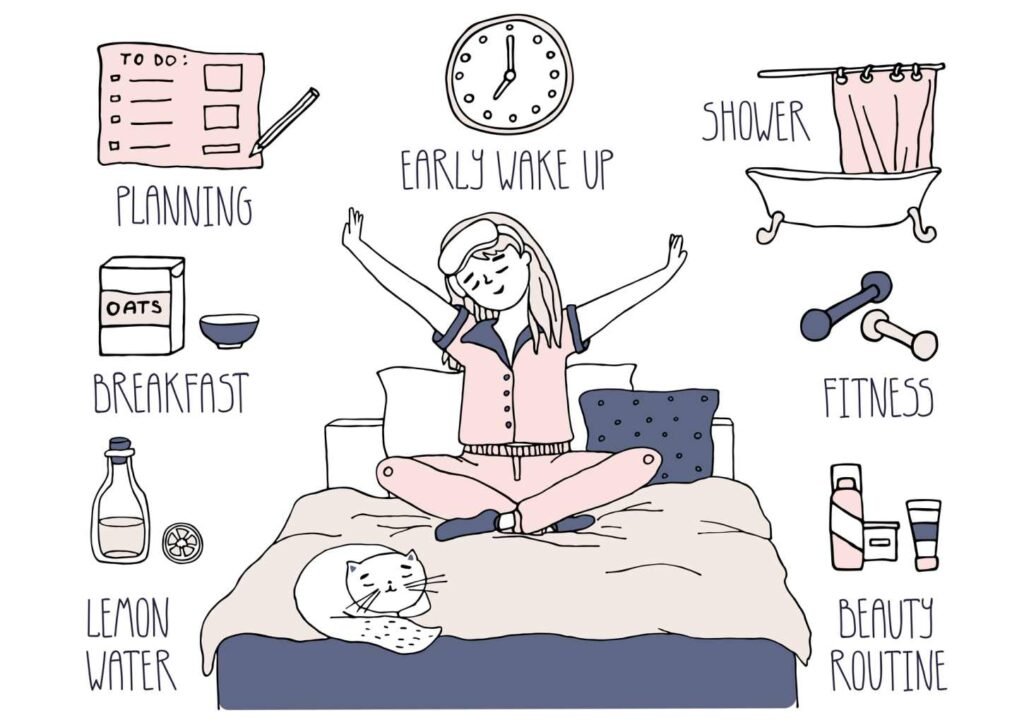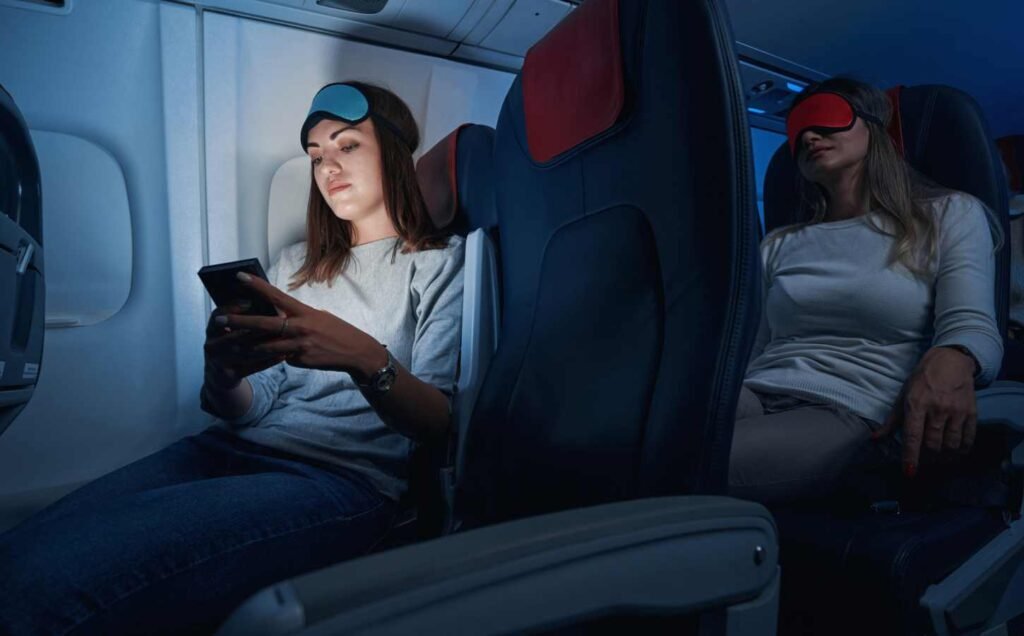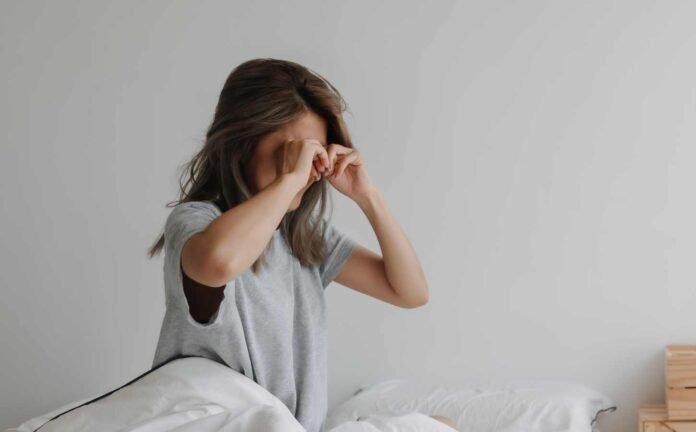Many people struggle with falling asleep and waking up, often feeling tired and groggy throughout the day.
This can be caused by a variety of factors, including stress, poor sleep habits, and underlying health conditions. Understanding the root cause of these issues is crucial for finding effective solutions.
One common cause of difficulty falling asleep is a racing mind. When the brain is overactive, it can be difficult to quiet the thoughts and relax enough to fall asleep. This can be exacerbated by stress, anxiety, or even just a busy schedule. Similarly, waking up feeling exhausted can be caused by poor sleep quality or interrupted sleep cycles. This can lead to a vicious cycle of daytime fatigue and difficulty sleeping at night.
Despite the prevalence of these issues, there are many strategies that can help improve sleep quality and make it easier to fall asleep and wake up feeling refreshed.

From establishing a consistent sleep routine to practicing relaxation techniques, there are many steps that individuals can take to improve their sleep habits. By understanding the causes of difficulty falling asleep and waking up, and implementing effective solutions, individuals can enjoy better sleep and improved overall health and well-being.
Understanding Sleep Disorders
Defining Difficulty Falling Asleep and Waking Up
Difficulty falling asleep and waking up are common sleep disorders that affect millions of people worldwide. Insomnia is the most common sleep disorder and is characterized by difficulty falling or staying asleep. Short-term insomnia lasts for a few days to a few weeks, while chronic insomnia lasts for a month or longer.
Sleep disorders can have a significant impact on a person’s quality of life, affecting their ability to concentrate, function at work, and maintain relationships.
Prevalence in Men, Women, and Children
Sleep disorders affect people of all ages and genders. However, women are more likely to experience insomnia than men. According to a study, around 40% of women report experiencing symptoms of insomnia compared to 30% of men.
Sleep disorders are also common in children, with around 25% of children experiencing some form of sleep disturbance.
It is essential to seek medical attention if you are experiencing difficulty falling asleep or staying asleep. Treatment options include lifestyle changes, such as improving sleep hygiene and avoiding caffeine and alcohol, and medication, such as sleeping pills.
In conclusion, understanding sleep disorders is crucial to managing and treating difficulty falling asleep and waking up. By recognizing the signs and symptoms of insomnia and seeking medical attention, individuals can improve their sleep quality and overall health.
Causes and Risk Factors
Difficulty falling asleep and waking up can be caused by a variety of factors, including physical health conditions, mental health and emotional stress, and lifestyle and environmental factors. Understanding these causes and risk factors can help individuals take steps to improve their sleep habits and overall well-being.
Physical Health Conditions
Medical conditions such as chronic pain, sleep apnea, and restless leg syndrome can make it difficult to fall asleep and stay asleep. Aging can also contribute to changes in sleep patterns, including difficulty falling asleep and waking up earlier than desired. Additionally, hormonal changes during menopause can cause sleep disturbances.
Mental Health and Emotional Stress
Stress, anxiety, and depression can all interfere with sleep. Individuals who are experiencing high levels of stress or emotional turmoil may find it difficult to quiet their minds and fall asleep at night. Similarly, those with anxiety or depression may experience sleep disturbances as a symptom of their condition.
Lifestyle and Environmental Factors
Lifestyle factors such as consuming alcohol or caffeine, irregular sleep schedules, and exposure to electronic devices before bedtime can all contribute to difficulty falling asleep and waking up. Environmental factors such as noise, light, and temperature can also impact sleep quality. Jet lag from travel across time zones can also disrupt sleep patterns.
Overall, recognizing and addressing the causes and risk factors of difficulty falling asleep and waking up can lead to improved sleep habits and better overall health.
Symptoms and Effects
Recognizing Sleep Disruption Symptoms
People who experience difficulty falling asleep and waking up may also experience a range of symptoms that signal sleep disruption. These symptoms can include daytime sleepiness, fatigue, irritability, difficulty concentrating, and changes in mood.
In addition, individuals may experience difficulty sleeping, such as difficulty falling asleep, waking up frequently during the night, or waking up too early in the morning. These sleep disruptions can lead to a decrease in the quality of sleep and an overall decrease in the quality of life.
Consequences on Daily Functioning
Sleep disruption can have significant consequences on daily functioning. Daytime sleepiness and fatigue can impair cognitive function, making it difficult to concentrate and perform tasks at work or school. This can lead to accidents and decreased productivity.
In addition, irritability and changes in mood can affect personal relationships, causing strain on both romantic and platonic relationships. Sleep disruption can also lead to a decrease in physical health, as it can weaken the immune system and increase the risk of chronic health conditions such as obesity, diabetes, and heart disease.
Overall, it is important to recognize the symptoms of sleep disruption and take steps to improve sleep quality in order to maintain overall health and well-being.
Diagnosis and Assessment
Consulting a Healthcare Professional
If an individual experiences difficulty falling asleep and waking up, it may be necessary to consult a healthcare professional. A doctor or healthcare provider can help diagnose and assess any underlying medical conditions that may be contributing to the problem. They may ask about the individual’s sleep patterns and habits, as well as any other symptoms they may be experiencing.
Sleep Studies and Diagnostics
In some cases, a doctor may recommend a sleep study or diagnostic test to help identify any underlying sleep disorders. A polysomnogram is a common test used to diagnose sleep apnea and other sleep disorders. During the test, the individual is monitored while they sleep to record various physiological parameters such as brain activity, eye movement, and muscle tone.
A sleep specialist may also be consulted to help diagnose and treat sleep disorders. They can provide guidance on improving sleep hygiene and may prescribe medications or other treatments to help manage the condition.
Overall, consulting a healthcare professional and undergoing diagnostic testing can help identify any underlying medical conditions that may be contributing to difficulty falling asleep and waking up. It is important to seek medical attention if the problem persists, as untreated sleep disorders can have serious consequences for overall health and wellbeing.
Treatment and Management
Medical Treatments and Medications
For individuals who have difficulty falling asleep and waking up, medical treatments and medications can be an effective option. Prescription medications, such as sedatives and hypnotics, can help to induce sleep and regulate sleep patterns. However, these medications can have side effects and may be habit-forming, so they should only be used under the guidance of a healthcare professional.
Another medication that can be used to treat sleep disorders is melatonin. Melatonin is a hormone that regulates the sleep-wake cycle, and can be taken as a supplement. It is important to note that the use of melatonin supplements should be discussed with a healthcare professional, as it may interact with other medications.
Behavioral and Lifestyle Interventions
Behavioral and lifestyle interventions can also be effective in treating difficulty falling asleep and waking up. These interventions include sleep hygiene practices, such as maintaining a consistent sleep schedule, avoiding caffeine and alcohol before bedtime, and creating a relaxing sleep environment.
Cognitive behavioral therapy (CBT) is another behavioral intervention that can be used to treat sleep disorders. CBT focuses on changing negative thought patterns and behaviors that may be contributing to sleep difficulties. It can be done individually or in a group setting, and has been shown to be effective in improving sleep quality.
Alternative Therapies and Aids
In addition to medical treatments and behavioral interventions, alternative therapies and aids can also be used to treat difficulty falling asleep and waking up. These include relaxation techniques, such as meditation, progressive muscle relaxation, and yoga, as well as herbal supplements, such as valerian root and chamomile.
It is important to note that the effectiveness of these alternative therapies and aids is not well-established, and they should be used with caution. It is recommended to discuss the use of these therapies with a healthcare professional before trying them.
Overall, there are a variety of treatments and management strategies available for individuals who have difficulty falling asleep and waking up. The most effective approach will depend on the individual’s specific needs and should be discussed with a healthcare professional.
Improving Sleep Habits
Developing a Regular Sleep Schedule
One of the most important aspects of improving sleep habits is to develop a regular sleep schedule. This means going to bed and waking up at the same time every day, even on weekends. This helps regulate the body’s internal clock, making it easier to fall asleep and wake up.
To develop a regular sleep schedule, it is recommended to keep a sleep diary for at least two weeks. This will help identify patterns in sleep habits and determine the optimal bedtime and wake-up time. Once a regular sleep schedule is established, it is important to stick to it as much as possible.
Optimizing the Sleep Environment
Another important aspect of improving sleep habits is to optimize the sleep environment. This includes creating a comfortable and relaxing atmosphere in the bedroom. Some tips for optimizing the sleep environment include:
- Keeping the bedroom cool, quiet, and dark
- Investing in a comfortable mattress and pillows
- Removing electronic devices from the bedroom
- Using relaxing scents, such as lavender, to create a calming atmosphere
It is also important to practice good sleep hygiene, such as avoiding caffeine and alcohol before bedtime, and engaging in relaxing activities before sleep, such as reading or taking a warm bath.
By developing a regular sleep schedule and optimizing the sleep environment, individuals can improve their sleep habits and enjoy a better quality of life.
Special Considerations
Sleep Disorders in Specific Populations
Sleep disorders can affect people of all ages and genders. However, there are some specific populations that are more susceptible to certain sleep disorders than others.
Children and Teens
Children and teenagers require more sleep than adults. Lack of sleep in children and teenagers can lead to behavioral problems, difficulty concentrating, and poor academic performance. Common sleep disorders in children and teenagers include sleep apnea, insomnia, and restless leg syndrome.
Adults
Adults may experience a variety of sleep disorders, including insomnia, sleep apnea, and restless leg syndrome. Stress, anxiety, and depression can also contribute to sleep problems in adults.
Women
Women may experience sleep disorders related to hormonal changes during menstruation, pregnancy, and menopause. These changes can disrupt the body’s natural sleep patterns and lead to insomnia, sleep apnea, and other sleep disorders.
Aging
As people age, they may experience changes in their sleep patterns. Older adults may have difficulty falling asleep and staying asleep, and they may wake up more frequently during the night. Sleep disorders such as sleep apnea and restless leg syndrome are also more common in older adults.
Men
Men are more likely than women to experience sleep apnea, a condition in which breathing is interrupted during sleep. Men may also experience restless leg syndrome and other sleep disorders.
Managing Sleep Issues During Pregnancy
Pregnancy can cause a variety of sleep problems, including insomnia, snoring, and sleep apnea. Hormonal changes, physical discomfort, and anxiety can all contribute to sleep problems during pregnancy.
To manage sleep issues during pregnancy, it is important to establish a regular sleep routine and avoid caffeine and alcohol. Pregnant women should also sleep on their side to improve circulation and reduce the risk of sleep apnea. If sleep problems persist, pregnant women should talk to their healthcare provider about possible treatment options.
Prevention and Awareness
Educating on the Importance of Sleep
One of the most effective ways to prevent difficulty falling asleep and waking up is to educate oneself on the importance of sleep. Many people underestimate the importance of sleep and fail to recognize the negative effects of sleep deprivation on their health.
Getting enough sleep is crucial for overall health and mental wellbeing. Lack of sleep can lead to a range of health problems, such as obesity, diabetes, heart disease, and depression. It can also affect cognitive function, making it difficult to concentrate and remember things.
To improve sleep quality, individuals should establish a regular sleep routine and create a sleep-conducive environment. This includes avoiding caffeine and alcohol before bedtime, keeping the bedroom dark and quiet, and avoiding electronic devices before bedtime.
Recognizing Early Warning Signs
Recognizing the early warning signs of sleepiness and fatigue is crucial to preventing difficulty falling asleep and waking up. Some common signs of sleepiness include yawning, difficulty concentrating, and feeling irritable or moody.
Individuals should also pay attention to their sleep quality and take steps to improve it. This includes avoiding large meals and exercise before bedtime, limiting screen time before bed, and creating a comfortable sleep environment.
By being aware of the importance of sleep and recognizing the early warning signs of sleepiness and fatigue, individuals can take steps to prevent difficulty falling asleep and waking up and improve their overall health and wellbeing.
Frequently Asked Questions
What strategies can help in breaking the cycle of insomnia?
There are several strategies that can help break the cycle of insomnia, such as establishing a regular sleep schedule, creating a relaxing bedtime routine, avoiding caffeine and alcohol before bedtime, and creating a comfortable sleep environment. Additionally, cognitive-behavioral therapy (CBT) has been shown to be an effective treatment for insomnia.
What could be causing sudden difficulties in sleeping at night?
Sudden difficulties in sleeping at night could be caused by a variety of factors, including stress, anxiety, depression, medication side effects, and changes in sleep patterns. It is important to consult with a healthcare provider to identify the underlying cause and develop an appropriate treatment plan.
Are there medical conditions associated with difficulty in both falling and staying asleep?
Yes, there are several medical conditions that can cause difficulty in both falling and staying asleep, such as sleep apnea, restless leg syndrome, and chronic pain. It is important to consult with a healthcare provider to identify any underlying medical conditions and develop an appropriate treatment plan.
What are the common types of sleep disorders that disrupt nighttime rest?
The common types of sleep disorders that disrupt nighttime rest include insomnia, sleep apnea, restless leg syndrome, and narcolepsy. It is important to consult with a healthcare provider to identify any underlying sleep disorders and develop an appropriate treatment plan.
How can I manage to sleep at night if I feel tired but remain awake?
If you feel tired but remain awake, it is important to establish a relaxing bedtime routine, avoid caffeine and alcohol before bedtime, and create a comfortable sleep environment. Additionally, practicing relaxation techniques such as deep breathing and progressive muscle relaxation can help promote sleep.
What treatments are available for someone who wakes up frequently during the night?
There are several treatments available for someone who wakes up frequently during the night, such as cognitive-behavioral therapy (CBT), medication, and lifestyle changes. It is important to consult with a healthcare provider to identify the underlying cause and develop an appropriate treatment plan.

Jet Lag Disorder: Causes, Symptoms, and Treatment

Jet lag disorder is a common condition that affects individuals who travel across multiple time zones. The human body has an internal clock, also known as the circadian rhythm, which regulates various physiological processes such as sleep-wake cycles, hormone secretion, and body temperature.
Continue reading about: Jet Lag Disorder
Shift Work Sleep Disorder: Causes, Symptoms, and Treatment

Shift Work Sleep Disorder is a sleep disorder that affects people who work non-traditional hours or rotating shifts. It is characterized by a disruption of the normal sleep-wake cycle, resulting in excessive sleepiness during work hours and difficulty sleeping during non-work hours. It is a common problem for shift workers, with an estimated prevalence of up to 25% among those who work non-traditional hours.
Continue reading about: Shift Work Sleep Disorder
Tired But Can’t Sleep: Causes and Solutions

Many people experience the feeling of being tired but can’t sleep. This can be a frustrating and exhausting experience that can disrupt daily life. There are many factors that can contribute to this issue, such as stress, anxiety, and certain medical conditions.
Continue reading: Tired But Can’t Sleep




